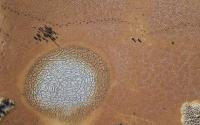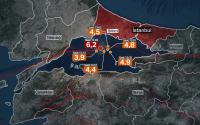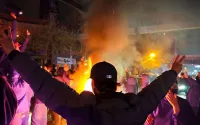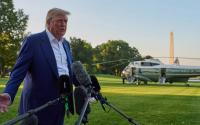NAJAF, Iraq, Aug. 14 -- Ahmed Eisa sent his wife and two young children out of Najaf "to make sure there is someone to remember me after I die" and took up his post near the shrine of Ali, he said, with an old AK-47 rifle to shoot at U.S. soldiers.
He says he is willing to die -- he insists he wants to die -- with the Mahdi Army, a militia loyal to a young Shiite cleric, because he is convinced that the United States intends to stay in Iraq and oppress Shiite Muslims.
As negotiations to end fighting in Najaf broke down Saturday, U.S. and Iraqi soldiers again prepared for an assault on the followers of the cleric, Moqtada Sadr. And on the other side of the sprawling cemetery that surrounds the shrine, Sadr's followers also prepared for battle.
Eisa, 34, who usually works in a graphics shop designing business cards and stationery, is a gunman for the Mahdi Army. He prefers the title sniper, but in fact, his ancient Kalashnikov is not very accurate, and the bullets often jam in the mechanism.
His job does not require accuracy, though.
"I am supposed to shoot at the American tanks to harass them, to draw their attention, to give my colleague some time to fire at them with an RPG" -- a rocket-propelled grenade, he said.
Eisa performed that duty five times during the recent fighting, darting from his position in the second line of Mahdi Army fighters. The first line hides behind a wall next to the cemetery, and the second line is poised in the warren of century-old brown brick houses that abuts the cemetery.
The Americans are on the other side. In between, among tombs as old as 1,300 years, are the contested killing grounds.
"I know the Americans have better weapons. They have better plans. They have uniforms that cost $3,000, and we have only our clothes," Eisa said. "But I have principles. I have holy land to defend. I have family to protect, so I feel stronger than them. The occupation forces are nothing but mercenaries who fight for money, so I feel stronger."
Eisa's fervor is shared by his fellow fighters in the Mahdi Army, though his background is not. Sadr has grown his militia -- their self-adopted name of army is somewhat grandiose -- from poor and young Shiites drawn to his revolutionary rhetoric. Eisa, however, is a graduate of a computer vocational college, an educated man who could be called middle-class and middle-aged.
A lean man at 5-foot-7 and 150 pounds, his pale face, glasses and uncalloused hands suggest a life spent indoors more than out. A full beard indicates his faith.
Eisa -- whose name means Jesus, considered a prophet in Islam -- explained in a lengthy telephone interview and further conversations in Najaf how he arrived at this point. For Iraq's Shiites, a sense of oppression comes legitimately. Shiites suffered under former president Saddam Hussein, and Eisa said he counts 27 relatives who were executed during that three-decade era.
"We don't even know where they were buried," he said.
After high school, Eisa fulfilled his compulsory military duty in the Republican Guard. He deserted three times, he said, which was not unusual for men living in the harsh conditions of the military. Each time, he returned under an amnesty.
He finished his service in 1993, then attended computer classes at a technological institute. He finished, got married and in 1998 began working in a graphics shop. Eisa said he welcomed the fall of Hussein, but not the U.S. occupation.
"I am old enough now to differentiate between occupation and freedom," he said. "It's not true that the Americans came to get rid of Saddam. It was only a trick to occupy the country."
"We all know that Bush announced twice that this is a crusade. So we know they are targeting a certain group," the Shiites, he said. "We know the strategic importance of Iraq in the region and the wealth of our country. They want to control it. They want to control our oil, our wealth and the world."
"There is something called patriotism," he added. "I like my country, and I saw the U.S. forces did not come to protect us. So I wanted to follow the leader who can demand my rights and defeat the occupation. The U.S. forces are occupiers, so we have to resist them."
Eisa fought in what he calls "the first uprising" against the Americans, fierce street fighting in Najaf between U.S. forces and insurgents in April that left hundreds of Iraqis dead. The Iraqi government that officially took power June 28 is nothing but a puppet of the Americans, he said, and Eisa willingly answered the call to arms nine days ago when fighting broke out again.
He kissed his daughter, 3-year-old Um Albanin, and his 6-month-old son, Mohammed Ali, and sent them with his wife to the safer outskirts of Najaf. He then joined his unit, the 315th Battalion.
The worst fighting was Thursday, he said.
"I smelled the weapons, and the blood of dead people," Eisa said, recounting the pitched battle in the graveyard that resulted in scores of casualties. "I don't know how many were killed. I heard the bullets and even felt the heat of the bullets, but God protects me.
"Sometimes we had wounded people, and we couldn't evacuate them because I didn't want to leave my post. I just wanted to die for my cause. So I stayed in my place, hoping to become a martyr.
"I saw one of my colleagues try to attack a tank with his RPG. The U.S. soldier shot him in the head, about 25 meters from me. His head was destroyed. It was a terrible scene."
As the fighting stopped Saturday while negotiators tried to work out a cease-fire, Eisa mixed in a throng of thousands of supporters who came from inside and outside Najaf to show their support for the Mahdi Army. They milled about outside the shrine. When he found a colleague he had not seen since the battle, the two hugged.
Eisa has an identity card -- "Sadr's Martyr Division," it says -- but like the others in the militia, he doesn't have a uniform. He wears loose fitting black pants, a casual shirt and a green cloth around his wrist to signify closeness to Allah.
As Sadr passed the crowd, Eisa joined in chants, thrusting his fist in the air and stamping his feet. "Long live Sadr! Allawi and the government are blasphemous," he shouted, referring to Prime Minister Ayad Allawi.
The temporary lull in fighting during the negotiations boosted the spirits of the men. "This is a great victory for the Iraqis and the Mahdi Army," Eisa said. "This is evidence that we defeated the occupation forces and we are a legitimate resistance demanding the Iraqi's rights. This is victory."
But if so, it was short-lived. The negotiations faltered late in the day. Eisa and the other militiamen slipped back to their posts at the edge of the cemetery, waiting for night. Waiting for the Americans.
Struck reported from Baghdad.
http://www.washingtonpost.com/ac2/wp-dyn/A1455-2004Aug14?language=printer






